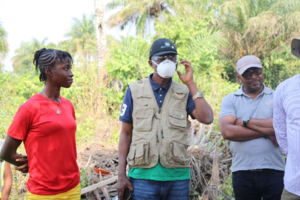In a bid to assess the progress and impact of the Food System Resilience Program (FSRP), the World Bank and the Ministry of Agriculture and Food Security (MAFS), in collaboration with implementing partners and key stakeholders, conducted a week-long Implementation Support Mission (ISM). The initiative, which commenced on January 21, 2025, focused on reviewing the program’s achievements, addressing challenges and strategizing for enhanced performance.
The mission kicked off at the FSRP office in Freetown with presentations highlighting the implementation progress. Discussions centered on key milestones, areas of improvement and strategies to optimize outcomes. To validate reported impacts, the World Bank team, alongside Government officials and stakeholders, visited multiple project sites and engaged directly with beneficiaries to ensure the program’s effectiveness in transforming communities.
One of the key locations visited was the Modern Vegetable Garden (MVG) in Newton, Western Rural District. This initiative has provided training and resources to over 25 youths and women, empowering them to become competitive out-growers and establish medium-scale farms. Isata Bangura, one of the beneficiaries, shared her experience: “FSRP trained me in vegetable production, which has significantly improved my productivity and household income.”
In Rokupr, Kambia District, the mission visited a seed storage facility managed by the Sierra Leone Agricultural Research Institute (SLARI) under the Feed Salone Seed System initiative. The facility plays a crucial role in multiplying and preserving foundation seeds. SLARI officials provided a progress report on their efforts to transition the center into a Regional Center of Excellence for Mangrove Rice. Dr. Adetunji Oredipe, the World Bank mission lead, reassured the Ministry of Agriculture and Food Security of continued collaboration to address key challenges in the process.
At the same event, Deputy Minister of Agriculture and Food Security 1, Dr. Theresa Tenneh Dick, awarded grants to six SLARI scientists to conduct adaptive agricultural research aimed at addressing food security challenges in Sierra Leone. Dr. Alfred Dixon, Director of the International Institute of Tropical Agriculture (IITA), lauded the initiative, emphasizing its potential to revolutionize agriculture in the country. The research projects will focus on:
- Operationalizing a Cassava Flash Dryer for high-throughput cassava processing
- Assessing dietary exposure and consumer awareness of major mycotoxins in Sierra Leone’s food
- Developing biogas systems to convert livestock waste into renewable energy
- Collecting and characterizing Mangrove Rice germplasm for breeding and conservation
- Applying biochar to improve soil fertility and enhance cassava productivity on degraded lands
- Promoting improved rice parboiling technology for mangrove rice processors
The mission team also toured SLARI’s Technology Park along the Port Loko-Makeni highway. With funding from FSRP, the park’s expansion is underway, with plans to establish another facility along the Bo-Kenema highway. These centers will provide hands-on training and showcase innovative agricultural technologies for farmer adoption.
In Makari Village, Bombali District, the team visited a rice processing facility managed by Med-Tula Agro Processing Center, which provides inputs such as seed, fertilizer, and mechanized land preparation to 1,000 FSRP rice farming households. Approximately 48% of these households are integrated into Med-Tula’s farmer network, ensuring market access for their harvests through institutional buyers, including school feeding programs. One beneficiary, Haja B. Koroma, shared her transformational journey: “I moved here due to marriage, but my husband abandoned me with two children in university. I used to break stones to pay their fees. Since receiving FSRP support through the agro-dealer, my life has changed. I can now afford their education without loans or manual labor. I am deeply grateful to the government and the World Bank.”
At Robaka Village, cassava farmers initially supported during FSRP’s emergency phase have successfully expanded production. Madam Cole, CEO of the organization, highlighted their achievements: “The emergency support enabled us to scale up production. We reinvested proceeds to acquire cassava processing machines, allowing us to produce gari, flour, and animal feed. However, we still face challenges in infrastructure and gender-friendly machinery.”
MAFS Director of Extension, Alpha Yayah Mansaray, reaffirmed the government’s commitment to supporting multiple agricultural value chains beyond rice, emphasizing increased investments in cassava cultivation and processing. He assured farmers of immediate support to improve harvesting and processing facilities.
The mission brought together representatives from the World Bank, MAFS, SLARI, IITA, the National Fertilizer Regulatory Agency (NaFRA), the National Water Resources Management Agency (NWRMA), the Sierra Leone Meteorological Agency (SLMet) and the National Farmers Federation. During wrap-up meetings on January 27, 2025, the mission team engaged with the Minister of Agriculture and the Minister of Finance to outline concrete action plans for sustaining and expanding the FSRP’s impact in the coming years.








